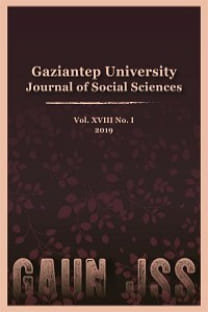Gündelik Dil Felsefesi Bağlamında Din Dili ve Doğruluk Problemi
Din Felsefesi, Din Dili, Gündelik Dil Felsefesi, Doğruluk, Doğrulama
Religious Language and the Problem of Truth in the Context of Ordinary Language Philosophy
Philosophy of Religion, Religious Language, Ordinary Language Philosophy, Truth, Verification,
___
- Alston, William P.. “Religious Language”. The Oxford Handbook of Philosophy of Religion. ed. William J. Wainwright. 220-244. New York: Oxford University Press, 2005.
- Altınörs, Atakan. Anlam, Doğrulama ve Edimsellik: Austin Üzerine Bir İnceleme. İstanbul: Alfa Yayınları, 2001.
- Aristoteles. Metafizik. çev. Ahmet Arslan. İstanbul: Sosyal Yayınlar, 2010.
- Aristoteles. Nicomachean Ethics. trans. F. H. Peters. London: Kegan Paul, Trench, Trübner & CO., 1906.
- Austin, J. L.. Söylemek ve Yapmak. çev. R. Levent Aysever. İstanbul: Metis Yayınları, 2017.
- Austin, J. L.. “Performative Utterances”. The Philosophy of Language. ed. A. P. Martinich. 120-129. New York: Oxford University Press, 1996.
- Aydın, Mehmet S.. Din Felsefesi. İzmir: İzmir İlahiyat Fakültesi, 2012.
- Aydın, Mehmet. “Tanrı Hakkında Konuşmak: Felsefî Bir Tahlîl”. Dokuz Eylül Üniversitesi İlâhiyat Fakültesi Dergisi 1 (1983), 25-44.
- Ayer, Alfred Jules. Dil, Doğruluk ve Mantık. çev. Vehbi Hacıkadiroğlu. İstanbul: Metis Yayınları, 1998.
- Blackstone, William T.. “The Status of God-Talk”. Religious Language and Knowledge. ed. Robert H. Ayers - William T. Blackstone. 1-17. North Carolina: The University of Georgia Press, 1972.
- Bor, İbrahim. Analitik Dil Felsefesinde Dil, Düşünce ve Anlam. Ankara: Elis Yayınları, 2014.
- Braithwaite, R. B.. “An Empiricist’s View on the Nature of Religious Belief”. The Philosophy of Religion. ed. Basil Mitchell. 72-91. Suffolk: Oxford University Press, 1978.
- Broiles, R. David, “Linguistic Analysis of Religious Language: A Profusion of Confusion”, Religious Language and Knowledge, ed. Robert H. Ayers - William T.
- Blackstone. 135-146. North Carolina: The University of Georgia Press, 1972.
- Chatterjee, Margaret. “Does the Analysis of Religious Language Rest on a Mistake?”. Religious Studies 10/4 (December 1974), 469-478.
- Church, Alonzo. “Intensional Semantics”. The Philosophy of Language. ed. A. P. Martinich. 53-60. New York: Oxford University Press, 1996).
- Davidson, Donald. “Truth and Meaning”. The Philosophy of Language. ed. A. P. Martinich. 92-103. New York: Oxford University Press, 1996.
- Donnellan, Keith. “Reference and Definite Descriptions”. The Philosophy of Language. ed. A. P. Martinich. 231-243. New York: Oxford University Press, 1996.
- Dwivedi, D. N., “The Grammar of Religious Language”. Religious Language and Other Papers. ed. N. S. S. Raman – Kedar Nath Mishra. 28-42. Varanasi: Narain Press, 1979.
- Evans, J. L.. “On Meaning and Verification”. Mind 62/245 (January 1953), 1-19.
- Ewing, A. C.. “Religious Assertions in the Light of Contemporary Philosophy”. Philosophy 32/122 (July 1957), 206-218.
- Ferré, Frédérick, Din Dilinin Anlamı (Modern Mantık ve İman). çev. Zeki Özcan. İstanbul: Alfa Basım Yayım Dağıtım, 1999.
- Flew, Antony. “Theology and Falsification: A Symposium”. The Philosophy of Religion. ed. Basil Mitchell. 13-22. Suffolk: Oxford University Press, 1978.
- Grice, H. P.. “Meaning”. The Philosophy of Language. ed. A. P. Martinich. 85-91. New York: Oxford University Press, 1996.
- Hare, R. M.. “Theology and Falsification: A Symposium”. The Philosophy of Religion. ed. Basil Mitchell. 13-22. Suffolk: Oxford University Press, 1978.
- Harrison, Victoria S.. “Metaphor, Religious Language, and Religious Experience”. International Journal for Philosophy of Religion 46/2 (2007), 127-145.
- Hick, John H.. Philosophy of Religion. New Jersey: Prentice-Hall Inc., 1973.
- Koç, Turan. Din Dili. İstanbul: İz Yayıncılık, 2012.
- Martinich, A. P.. “Introduction”. A Companion to Analytic Philosophy. ed. A. P. Martinich – David Sosa. 1-5. Cornwall: Blackwell Publishers, 2001.
- Mitchell, Basil. “The Justification of Religious Belief”. New Essays on Religious Language. ed. Dallas M. High. 178-197. New York: Oxford University Press, 1969.
- Mitchell, Basil. “Theology and Falsification: A Symposium”. The Philosophy of Religion. ed. Basil Mitchell. 13-22. Suffolk: Oxford University Press, 1978.
- Nielsen, Kai. “Religion and Commitment”. Religious Language and Knowledge. ed. Robert H. Ayers – William T. Blackstone. 18-43 North Carolina: The University of Georgia Press, 1972.
- Nielsen, Kai. “Wittgensteinian Fideism”. The Journal of the Royal Institute of Philosophy 62/161 (July 1967), 191-209.
- Osman, Fikret. Tanrı Üzerine Konuşmanın Anlamı: Din Dilinin Mantıksallığı Problemi. Bursa: Asa Kitabevi, 2011.
- Özcan, Zeki. Dil Felsefesi II (Gündelik Dil Paradigması). İstanbul: Sentez Yayıncılık, 2016.
- Putnam, Hilary. “Meaning and Reference”. The Philosophy of Language. ed. A. P. Martinich. 284-291. New York: Oxford University Press, 1996.
- Quine, W. V.. “Two Dogmas of Empiricism”. The Philosophy of Language. ed. A. P. Martinich. 39-52. New York: Oxford University Press, 1996.
- Scott, Michael. “Religious Language”. Philosophy Compass 5/6 (June 2010), 505-515.
- Searle, John R.. Söz Edimleri. çev. R. Levent Aysever. Ankara: Ayraç Yayınevi, 2000.
- Smith, Robert V.. “Analytical Philosophy and Religious/Theological Language”. Journal of Bible and Religion 30/2 (April 1962), 101-108.
- Strawson, P. F.. “Meaning and Truth”. The Philosophy of Language. ed. A. P. Martinich. 104-114. New York: Oxford University Press, 1996a.
- Strawson, P. F.. “On Referring”. The Philosophy of Language. ed. A. P. Martinich. 215-230. New York: Oxford University Press, 1996b.
- Utku, Ali. Ludwig Wittgenstein: Erken Döneminde Dilin Sınırları ve Felsefe. Ankara: Doğu Batı Yayınları, 2014.
- Wisdom, John. “Gods”. Proceedings of the Aristotelian Society 45 (1944 -1945), 185-206.
- Wittgenstein, Ludwig. Felsefi Soruşturmalar. çev. Deniz Kanıt. İstanbul: Totem Yayıncılık, 2006b.
- Wittgenstein, Ludwig. Tractatus Logico-Philosophicus. çev. Oruç Aruoba. İstanbul: Metis Yayınları, 2006a.
- ISSN: 1303-0094
- Yayın Aralığı: Yılda 4 Sayı
- Başlangıç: 1991
- Yayıncı: Gaziantep Üniv. Sosyal Bilimler Enst.
Kanun Hükmünde Kararnameler ile Cumhurbaşkanlığı Kararnamelerinin Karşılaştırılması
Bayram DOĞAN, Ali Fuat GEYİK, Emine Esra BOZKURT
Şebnem İşigüzel'İn Çöplük Romanında Yeraltı Edebiyatı'nın İzleri
BÖLGESEL SORUNLARIN KÜRESELLEŞMESİ: DOĞU AKDENİZ ÖRNEĞİ
Alpcan ACAR, Süleyman EKİCİ, Osman AĞIR
Comparison of the Financial Performance of Turkish Cement Firms with Fuzzy SWARA-COPRASMAUT Methods
Kuşak Yol Ülkelerinin Lojistik ve Çevresel Performansının Analizi
DİJİTAL TEKNİKLERLE ÜRETİLEN ÇİZGİ ROMANLARIN GERÇEKLİK VE HAYAL GÜCÜ ALGISI ÜZERİNE ETKİSİ
Gündelik Dil Felsefesi Bağlamında Din Dili ve Doğruluk Problemi
Y Kuşağının Örgütsel Bağlılık ve Sadakati: Siyasi Partiler Üzerine Bir İnceleme
Işıl USTA KARA, Sedef ZEYREKLİ YAŞ
